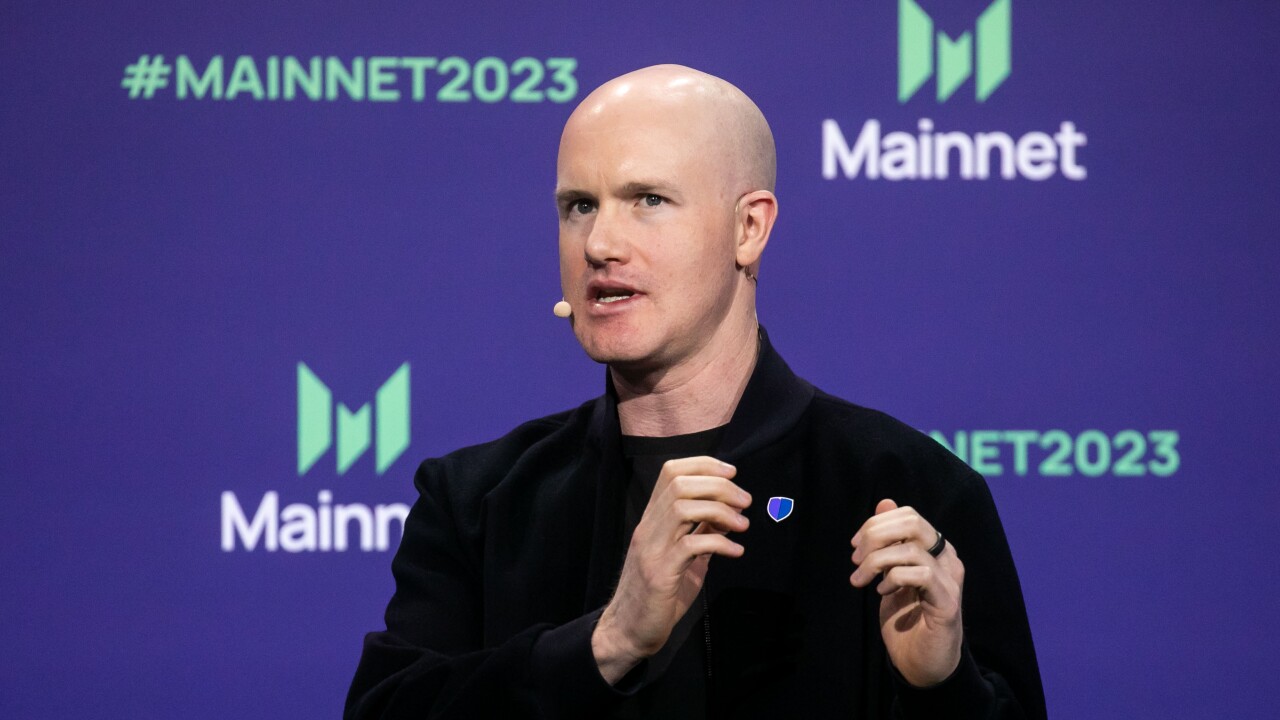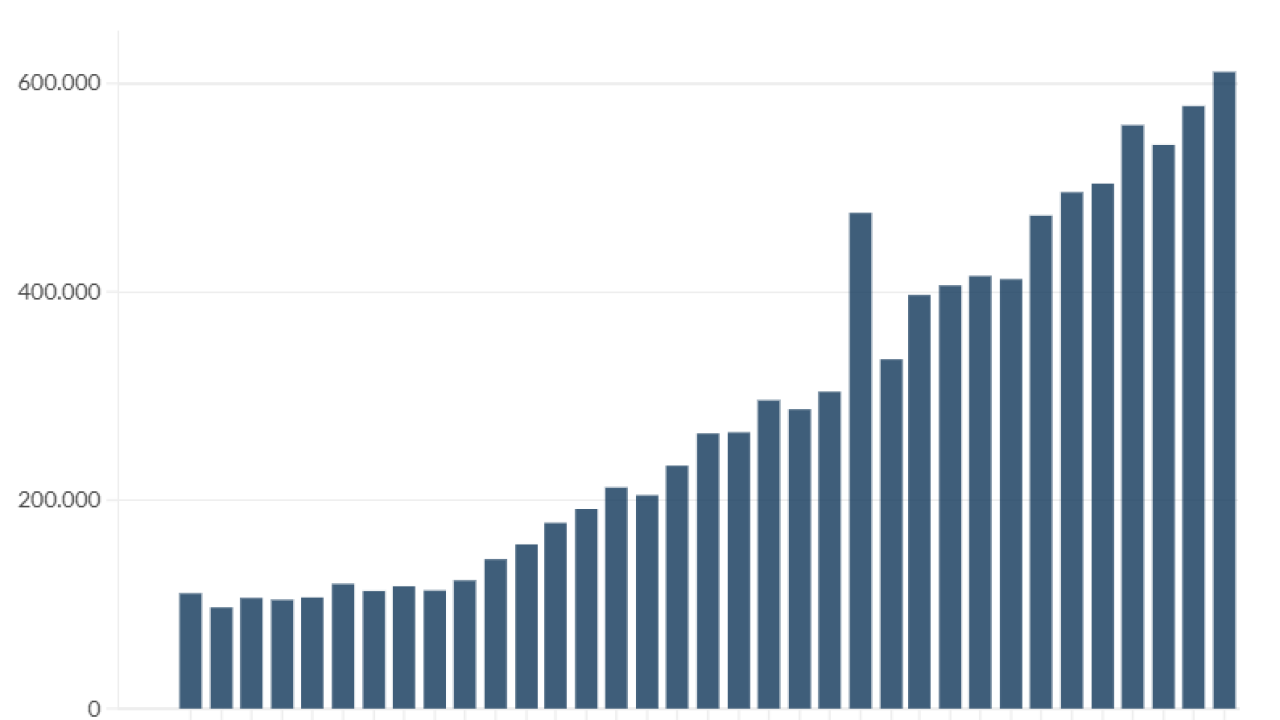Who cares if the mortgage refinancing boom is losing its oomph? Not Angelo R. Mozilo.
He is piloting the huge Countrywide Credit Industries to another record-smashing year - and he has no plans to let up for the rest of the decade.
The Pasadena, Calif., mortgage bank is on track to produce some $40 billion in home loans this year, up more than 30% from 1992. That's no mean feat, considering that last year's tally was nearly double the previous industry record.
Lately, the stock market has been worrying whether Countrywide can keep cranking out the loans. Amid fears of rising interest rates - and falling loan demand - the company's stock price tumbled 7% on June 3.
Still Confident
But nothing seems to shake Mr. Mozilo's confidence.
"We have plenty of room to grow," says the deeply tanned executive.
Countrywide, which currently commands 3.8% of the nationwide mortgage market, plans to boost that share to 6% within five years, Mr. Mozilo said in a recent interview. That could translate into annual originations of $60 billion.
To carry out the plan, Countrywide is rapidly expanding its branch network.
The company plans to add 50 retail offices this year, along with more than 100 smaller offices it calls satellites, company executives say. That's on top of the 120 retail offices and 61 satellites it has now.
Most of the new offices will be outside California, which currently accounts for about half of its business.
Helped by Refinancing Boom
Part of Countrywide's success up to now has stemmed from favorable circumstances. With mortgage rates at a 20-year low, the boom in refinancings has been a major source of revenues even with its California base in a severe economic slump.
But the other part of Countrywide's success has been timing.
Mr. Mozilo, the company's vice chairman and outside man extraordinaire, and David Loeb, its chairman and consummate inside man, have pounced on every opportunity provided them by the economic fates, the secondary markets, and a battle-weary competition. (See story about Mr. Loeb on page 11.)
Their major weapon has been - and continues to be - unusually low origination costs, which allow it to discount its prices without sacrificing profits.
But even with this potent weapon, the 6% market share that Mr. Mozilo covets will be hard to attain.
While Countrywide already has about 6% of the market for refinancings, its share of mortgages for home purchases is much smaller. And as the refinancing boom tails off, the company will have to run hard in the purchase market to build its total market share.
Industrywide, applications for refinancings have fallen about 50% in the past 10 weeks, according to index maintained by the Mortgage Bankers Association of America.
"Our focus is on substantially increasing our market share of purchase mortgage transactions," Mr. Mozilo says.
Retail Office Expansion
The rapid buildup of retail offices fits right in with that goal. One of the main functions of the offices is to handle homebuyers referred by real estate agents.
Right now, Countrywide gets only about 25% of its originations from its retail offices, with the rest coming from a network of mortgages brokers, banks, thrifts, and mortgage companies.
With the branch system expanding, the retail share should rise to 50% within 36 months, Mr. Mozilo says.
That could have the added benefit of defusing criticism that Countrywide is too dependent on brokers for originations.
Some rivals claim that the brokered loans could eventually prove to be less creditworthy than those originated by the company itself. Although Countrywide sells all its loans on the secondary market, it can be forced to buy back the loans if fraudulent practices by the brokers are detected later on.
Mr. Mozilo, for his part, insists that there is no difference in credit quality between mortgages it originates itself and those it buys from brokers.
Focus on Low-Income Market
Meanwhile, Countrywide is devoting increasingly more fire-power to low-income homebuyers, a group that Mr. Mozilo sees as underserved.
A child of immigrant parents, he has some strong ideas about lender responsibility. During his recent tenure as head of the Mortgage Bankers Association, he recalls, he challenged the validity of findings of loan bias in data gathered under the Home Mortgage Disclosure Act.
"I was wrong," he says today with characteristic bluntness. "We're not doing enough as an industry."
Mr. Mozilo says that low-income lending is not only as a responsibility but as good business. He points out that delinquency rates have been lowest among low-income groups.
But Countrywide won't have that market to itself.
Says Richard Deihl, chairman of H.F. Ahmanson & Co. of Irwindale, Calif, the nation's largest thrift company: "We've been in that market all along. We know it's a good market. And we expect we'll have a lot of competition there from mortgage banks. But we used to have a lot more competition from other thrifts, too."
The big thrifts appear to be biding their time and awaiting an updraft in interest rates that they believe will rekindle the public's appetite for the adjustable-rate mortgages they prefer to write. Those loans have been unpopular for the past two years, with consumers preferring to lock in low rates on fixed loans.
Adjustable Loan Market
Whenever the market for adjustables comes back, however, Countrywide is sure to be a big player. In fact, the company already is gobbling up market share in ARMs. About 25% of its originations are adjustables these days, possibly making it the largest ARM originator in the country. I
Mr. Deihl, meanwhile, is taking a wait-and-see attitude. "We see the other big thrifts and now B of A and Wells Fargo as our top competitors. We've been in a falling-rate environment, and we don't know how good Countrywide and other mortgage bankers are as competitors" when rates are rising, he says.
"We have not been trying as hard because we don't want to hold fixed-rate loans," he added.
James F. Montgomery, chairman and chief executive of Chatsworth, Calif.-based Great Wester Financial Corp., the No. 2 thrift company, is similarly inclined to play down Countrywide's role as a competitor.
"Our biggest competitor is now the secondary market. It's tougher to be a portfolio lender these days," he says.
How tough Countrywide will be when the big thrifts leap back into the mortgage market remains to be seen. But its latest incursion into retail lending could be significant.
High Profits
Its small, low-cost retail offices have been highly profitable. Because it has no commissioned loan officers - relying instead on advertising and customer referrals - the company can offer consumers rates that would squeeze the higher-cost thrifts.
Ultimately, the big question about Countrywide may be whether it is growing too much too quickly. All too often, trouble follows quickly on heels of rapid growth in financial services.
But most analysts and mortgage executives are betting that Countrywide will prove to be an exception to the rule. The company is an acknowledged leader in technology and keeps tight rein on its network of offices, which it has kept small, inexpensive, accountable, and easily opened and closed.
Probably the worst scenario for Countrywide, and for the industry as a whole. would be rapidly rising interest rates without economic growth. This would mean an end to refinancings and declining demand for purchase loans.
But even in this setting, analyst says, Countrywide's earnings would be buffered by strong servicing income. Servicing would be helped because prepayments would slow down.
So when the big thrifts finally decide to climb back into the mortgage ring, they may find that they are the underdog challengers and Countrywide is the reigning champion.





